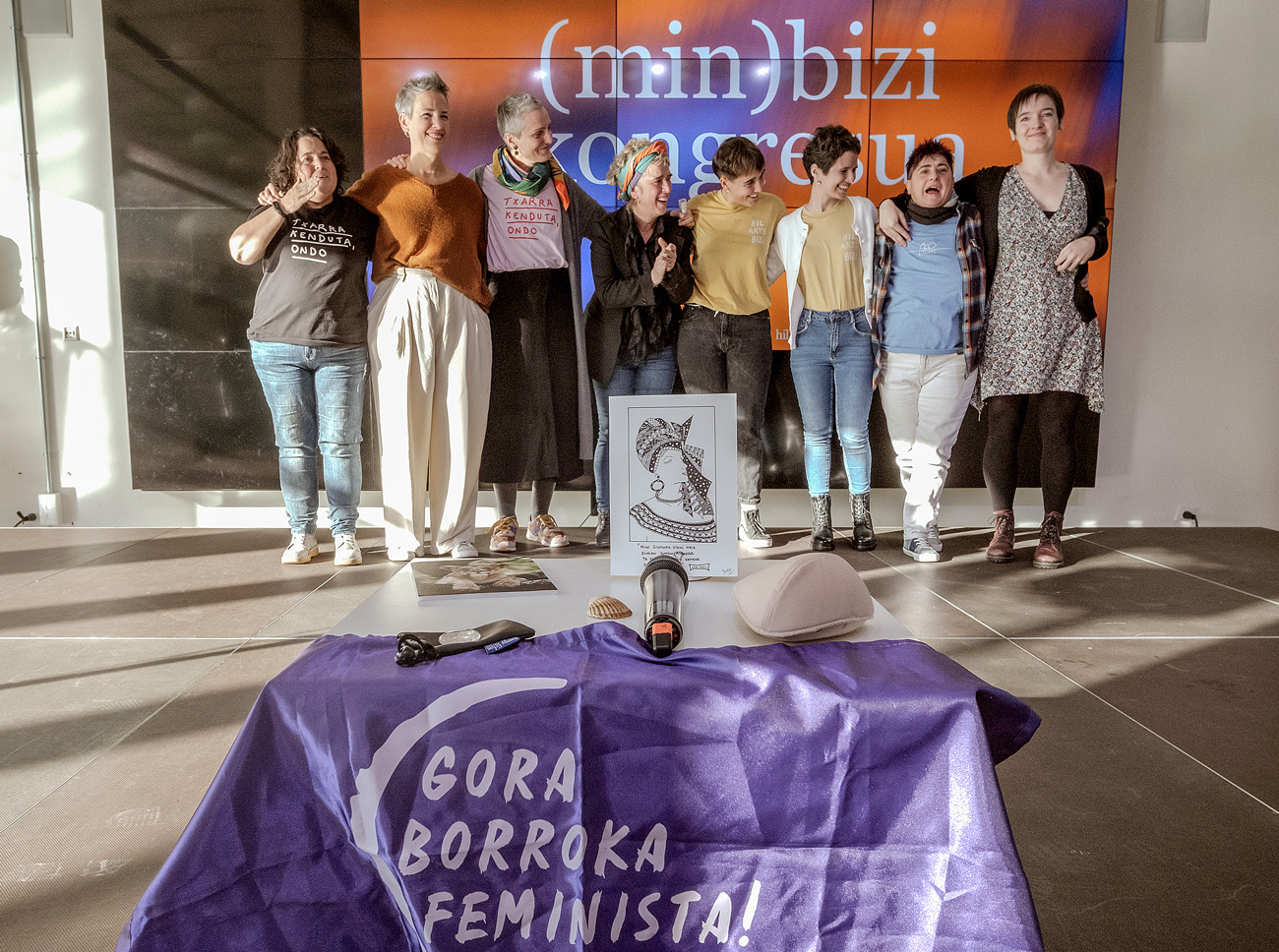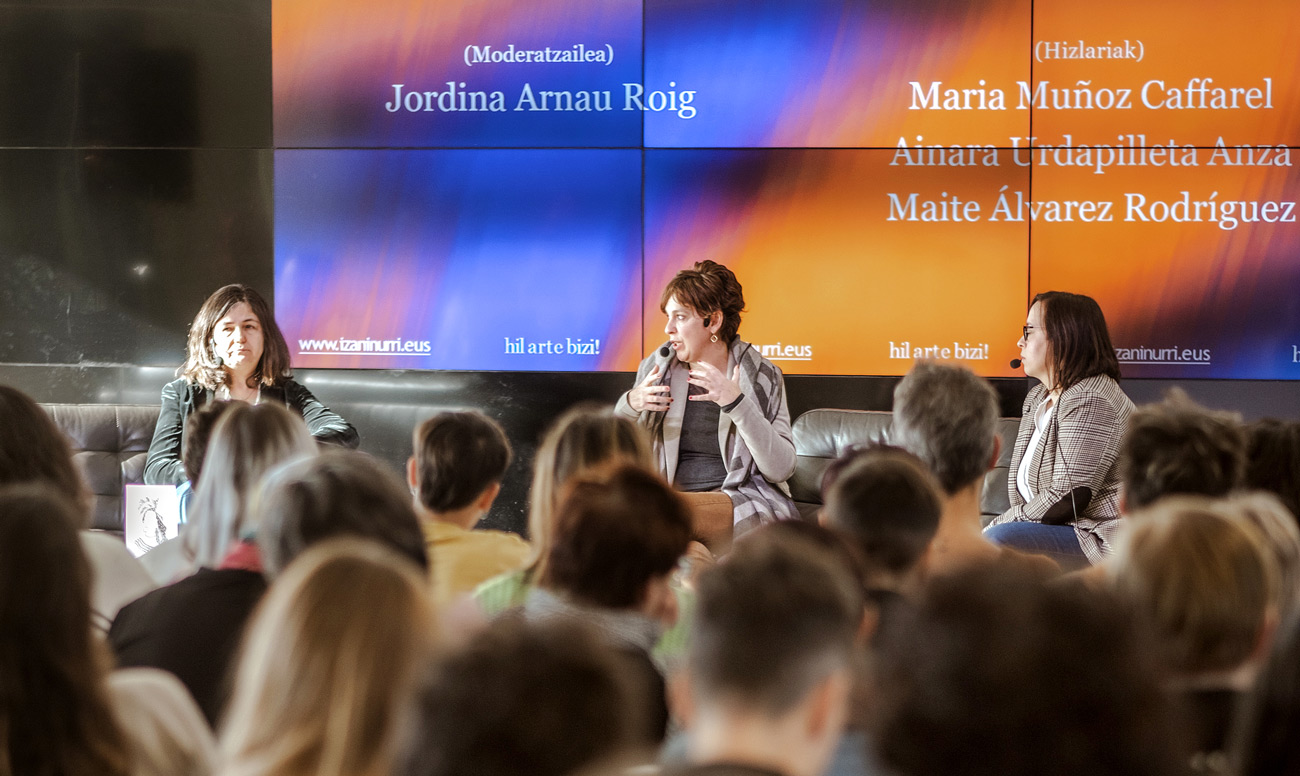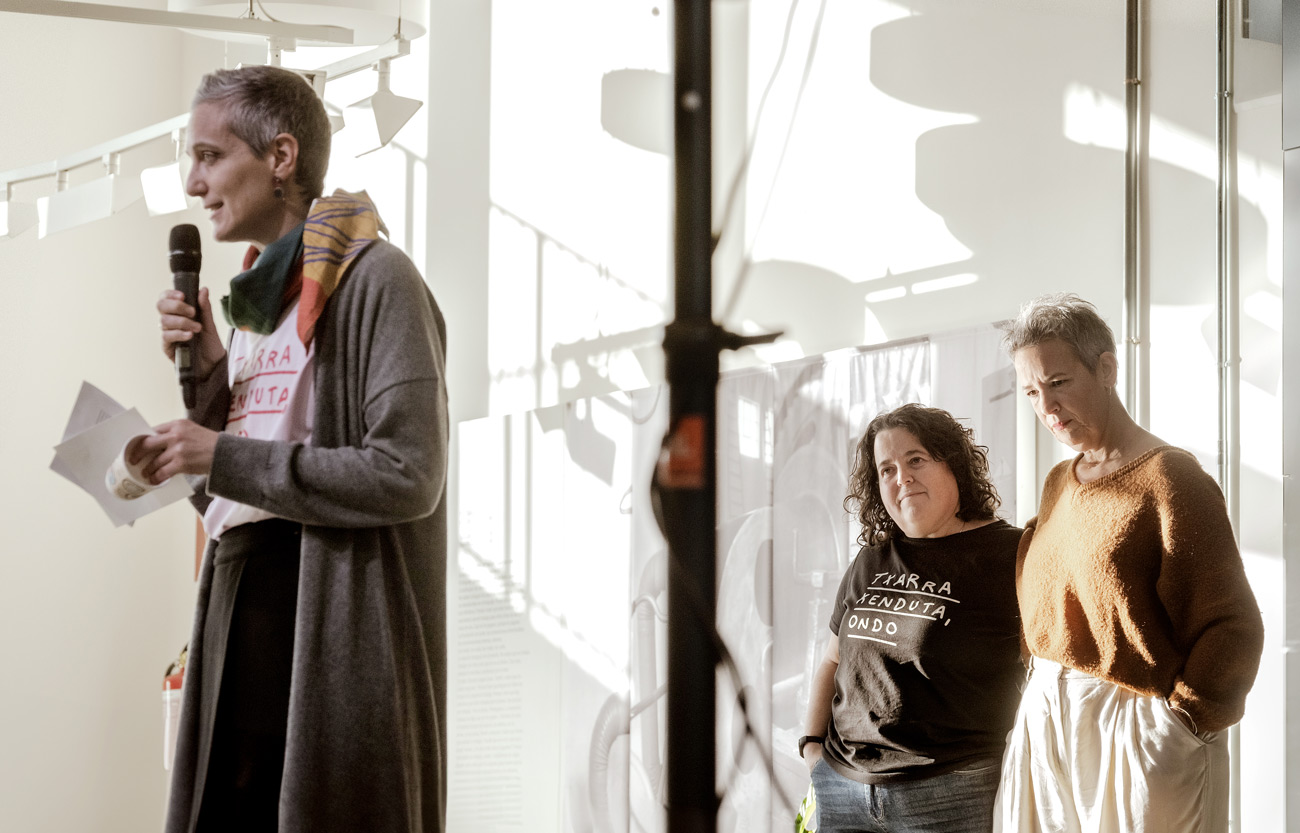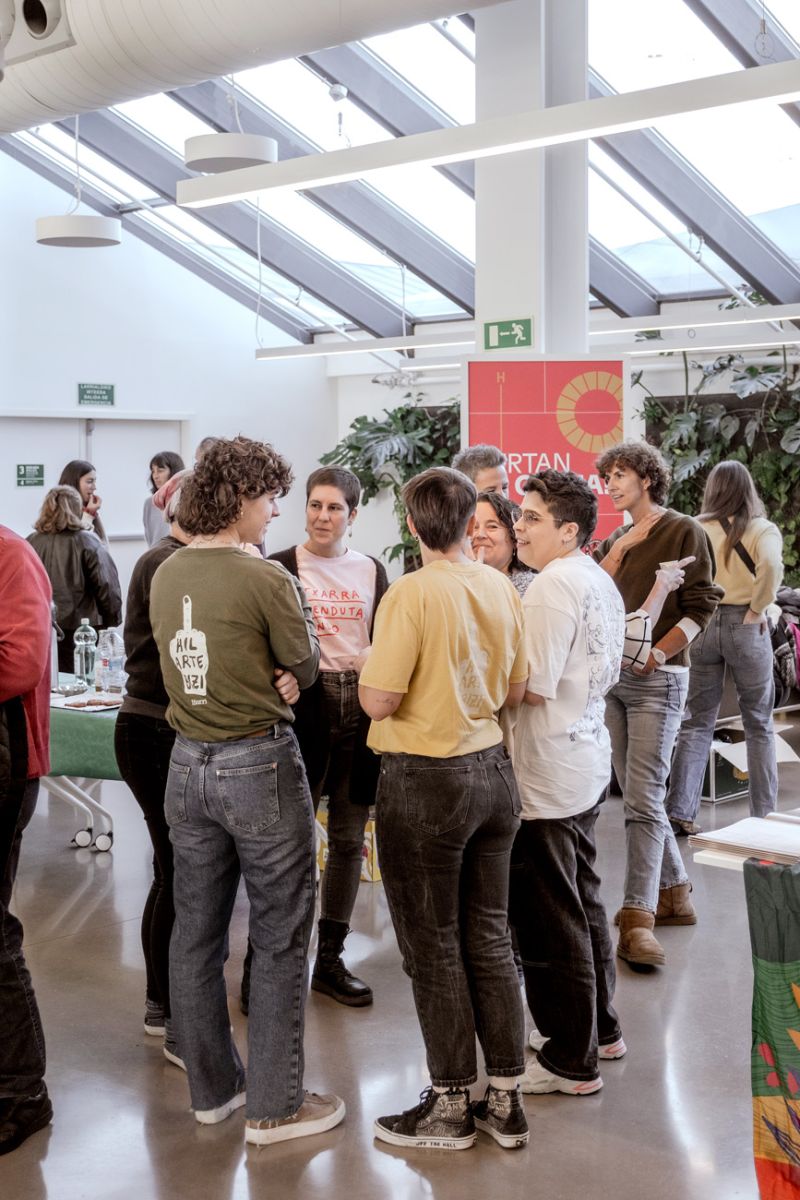
What is cancer? How to live from pain? How does a 22-year-old girl who has her whole life ahead face death? How to help a sick mother? Why me? If I hadn't taken that gin-tonic would have been cured? How can I have painless sex? Will I recover the desire? Is it harmful to do sport with metastasis? Will the smoked diet benefit me? Congress attendees have 11 questions that have not been answered in the corridors of Onkologikoa and have sought a joint solution. Among other things, they have called for research, public resources, health workers and comprehensive care to be guaranteed, and have recalled the need for a “network that keeps you down”.
Last day in Tabakalera de Donostia it was an important day to weave the ants network and since the morning dozens of people have emotionally filled the room. His life and death are involved in the news of the death of his sister Aitziber Ugartemendia: “We’ve started the day with a setback, but cancer is a mixture of death and life. That’s why we say we live to death”, reminds us naturally of Jordina Arnau and Olatz Mercader, members of Inurri and moderators of the congress.
One of the founders of the Miren Cuerdo association has begun the congress with the staging of the crude death and memory of Aitziber, but without the cancer breaking: “Death is not the end of a fight against cancer. Struggle, revolution and real need are in public health, in government and in society. It is everyone’s responsibility.” It calls for compassion to be rejected and for them to listen to their demands.
Cancer is not a single reality, clarified by the rapporteurs of the three round tables, guests who work professionally on cancer in one way or another. Researchers Maria Muñoz and Maite Álvarez, who investigate cancer at the Instituto Biogipuzkoa de Investigación Sanitaria Vasca and Biobizkaia respectively, have explained that this disease is a “DNA pain”, that is, a cellular change that occurs in the body itself. But it has its peculiarities. “The problem is that it is not local, it adapts and expands. It is not only a tumor, but also its environment.” And why doesn't our immune system take cancer and fight it? Álvarez has made the analogy with the animals: “It’s like predators and prey. We are willing to protect ourselves from the predator, but this predator depends on him.”

Currently, some of the objectives of their studies are to try to improve treatments so that the immune system is able to fight cancer, decrease the toxicity of these treatments and, in relation to metastasis, understand how cells in the environment help tumor cells spread metastasis. “We’re not fighting everything, we’re fighting for you,” lead the unique mammals, balds and women who are listening to the explanations. Muñoz tells them that the doors of the San Sebastian laboratory are open to those who want it and invites them to know the tests closely so they have another tool to better understand cancer.
“More research, more life,” Muñoz says. In Euskal Herria, the most cutting-edge research of the institutions stand out, but both researchers talk about scarcity of resources, although they admit that there has been much progress. The bureaucracy of the Spanish State is the main obstacle, as in other European states it is said that they grant funds to finance five-year projects, and they criticise that in their case at all times they have to go asking for small grants from there and from here: “We should be investigating, we cannot be thinking about whether 30,000 euros will be provided to us in order to be able to spend the next month and what role we have to play to achieve it.” They call for less bureaucracy and shorter processes: “600 days [almost two years] after admission of some treatments have passed through hospitals.” They warn that speed is fundamental.
The health psychologist Ainara Urdapilleta has highlighted the great ignorance of cancer, as today’s society turns its back on painful realities, as they relate to death and “fear us”: “We think bad things will happen to others and not to us”. And if the neighbor has cancer, are we willing to go along? Urdapilleta says we are not educated to listen and help: “This painful reality makes us so moved that we try to control the situation and seek the solution instead of focusing on the suffering of the former. From fear we cannot accompany a person. We have to connect with life.”
That's the basis of the seven anteaters who have told their testimonies onstage, living, and remember that Aitziber, who's just passed away, did the same thing. “Aitziber’s energy has not been to fight, but to live.” Energy is the body or force of will to act. But as Inurri's members know very well, many times those in the cancer process need more strength than they do to work. In Inurri they also claim survival as an act, and they say that the support of their members is “a hand to get out of the fort”. The tingling process is composed of people who are in the same situation, but everyone experiences the process with their context and body spirit.
Iara Alonso, 22 years old: “Here we are to remind the world that young people also have cancer”
They remember that cancer has made them feel like a Dragon Khan and is far from the beliefs and stigmas that have spread in society. With the voice cracked, both in humor and rage, they have shown that there are countless forms of cancer. For example, Iara Alonso, 22, and Eli Bergaretxe, 28, state that the belief that cancer occurs from a certain age is mistaken. “Here we are to remind the world that young people also have cancer,” and they have gone up on stage saying that “being young does not guarantee that you will not have cancer.” This is the topic they have addressed in the podcast (Min) and have collected testimonies of up to 30 years in the second season they premiered in late December to give visibility to juvenile cancer.
Everyone has confirmed that the tribe founded in Inurri has been a refuge and an empowering space, and Elena Guinea has highlighted a key: “It gives us the opportunity to be active subjects.” That is, beyond the role of patient and patient, they are people who make decisions in the process. Oihana Iguaran has closed in verse the space of the testimonies as follows: “It’s an ant to disable a system that wants to erase us / because it’s still revolutionary to take care of us.”
Another belief that Congress has attempted to eliminate is that the life of a person with cancer is none other than cancer. And in the case of metastasis, what? Some who have been in the same audience in Tabakalera have been on treatment for ten years, or with incurable metastases, that have asked for more resources to make their lives habitable.

Maria Muñoz and Maite Álvarez have confirmed that more and more cases are being seen, that is, people who live long with cancer. One of the objectives of researchers is to maximize life: “Five or six years ago they died and now some are cured, and if not, the goal is to win days, weeks, years, in that we are fighting.” They say that the improvement in immunotherapy treatments in recent years is huge and that there are therapies with very good results in combination with chemotherapy. “Treatments that have revolutionized cancer are, among others, those that help control the tumor more and extend life.”
People with metastatic cancer are constantly moving to cancer and Ane Pescador, a nurse from the Oncologic of San Sebastian, says he has seen the situation worsen. He has been working on it for nine years, so he knows his old and new oncology: “I preferred the previous one. You could do it all the same day: tests, chemistry, diagnosis... About three days ago, because it's in different places." Consequently, he says that they only become ill and lose their day-to-day life, because they cannot combine the process, such as work or life. Moreover, it has confirmed the existence of long waiting lists, and both the nurse and a large part of the audience have warned that the stress and anxiety generated by waiting for the doctor's call in these moments of great uncertainty are harmful. He says that public health is “dehumanized” and asks that each person have more time to care for it, that more professionals should be put in, says Fisherman.
Janire Ortega, physiotherapist: “Pelvic floor dysfunction is very common after cancer treatment and is not said”
The oncologist Jesús Manuel Blanco shares his opinion: “That takes money. But we should not talk about money, but about the needs of the sick.” It defines as a ginkana the oncological process of a cancer patient, from the medical consultation to the tests, then another doctor... “They feel lost, they don’t know where to go... humanization is difficult because there are professionals in certain places.” Blanco also says that it is important that the space is nice, and that there have been improvements in this sense in the Oncologic of San Sebastian, because they have given heat and proximity to the environment, for example in the waiting rooms. However, it clarifies that the basis is in time: “By law it takes 20 minutes per patient, but some may need more. And also, sometimes per workload there are not 20 minutes.”
Physical exercise, physiotherapy and nutrition barely occupy space in this cancer ginkana, as reported in the congress. These are areas that can help fight cancer and are part of comprehensive care. The physiotherapist Ane Arbilwaukee and the expert in Physical Activity and Sport Garbiñe Lozano consider it “essential” to guarantee a quality service of the physiotherapist in the public system. On the one hand, they point out the need for an adequate physiotherapist room for the individualized treatment of each patient, and on the other, the need for the physiotherapist who cares for cancer patients to be specialized, as it is currently not ensured that this component knows about cancer: “It is imperative that the physiotherapist who has assigned you have all the information about all cancers.”
As for physical exercise, they say there is a lot to do to see where the limit for safe physical activity is and when it is not recommended. “Professionals are very afraid when we hear cancer,” says Lozano. People who have received chemotherapy so far are told to avoid movement, as there is a risk of heart abnormalities, according to Arbilwaukee. “But now there are those who dare to try some exercises, and things are slowly coming out.”

Maider has seen from the public that she has had metastatic breast cancer for ten years: “At Onkologikoa we were offered to participate in a study to learn about the consequences of physical exercise. We realized that it was very useful for us to do these force exercises. And we wanted to go on, but the research ended. We touched the doors, a space offered by the City Hall of San Sebastian, but we have few resources”. She recognizes that if she sees her tests she doesn't seem to be able to move, but she encourages others to go from fear of being active subjects, even if she recognizes the need for information.
It has been concluded that some physical exercises have brought benefits for people with cancer, but research is minimal
Arbil adds that nutrition is also important, “to determine the effect of moving without nutrients.” What should someone who has cancer eat? Josune Ciriza, a dietitian nutritionist, explained that the oncologist’s response is “whatever you want” or “the Mediterranean diet”. When feeding, the patient begins to seek information and Ciriza warns that care should be taken with the special diets recommended by “cousins” or “social media gurus”. The role of the nutritionist stands out: “If the patient has doubts and fears about what he is eating, having the information of a nutritionist also helps him emotionally.” Research has shown that with proper nutrition, cancer and the effects of treatment are better combated, according to Ciriza. Members of the congress ask that this service be personalized and offered in oncology.
Psychologist Ainara Urdapilleta has highlighted that in the cancer process the disease-free phase is “very hard and forgotten.” He says post-traumatic symptoms may appear, such as the feeling of loneliness and the feeling of lost relationships or realities. “It causes crises in the whole environment: sex, relationships, family, work... you have to gather everything and find the balance.” Emotional and family support is needed to cope with changes, according to Urdapilleta, and support to relieve stress and help make decisions.
In the case of sexuality, physiotherapist Janire Ortega and psychotherapist Garbiñe Merino remember that the consequences of passing cancer are multiple. From diagnosis to treatment. “We are also afraid before receiving treatment and we have the body paralyzed, it is difficult to connect with desire,” explains Ortega. Treatment then causes a dramatic change in female hormones: “I am emotionally prepared, but the body is not at that point. That is where the grief begins, when we feel that the new body does not respond to the stimuli that were previously awakened by desire”. This awakens guilt, anger, and starts a process to look for new ways of wanting, explain that some need professional support.

They complain that in oncology they do not give information about drying or sexual intercourse. “Pelvic floor dysfunction is very common after treatment and is not said,” Ortega said. It asks that the desire of women not be subordinated to that of men and that sexuality as a whole be treated from a feminist perspective. In fact, the solution they offer now is to use the lubricant for penetration. Ortega describes the seriousness of the situation with the cases of his consultation: “I’ve had some patients who have told you when you want to have sex with penetration to drink two glasses of wine. Or they give anesthetic creams to others.”
All congressmen are mourning the withdrawal of cancer in one way or another, but this meeting point has allowed them to unify the demands and feel heard. He dismisses the day between hugs, smiles and tears, and especially with handles to move on. Look at Cuerdo remembers that Inurri’s objectives are different: “This is a congress, not a party. This is a claim. It is a request that we want to open and listen to the four winds. A right. Many people are dying before their time. Let us not make up the cancer of flowers and pink paintings.”
Two years ago, the Catalan archaeologist Edgard Camarós, two human skulls and Cancer? He found a motif card inside a cardboard box at Cambridge University. Skulls were coming from Giga, from Egypt, and he recently published in the journal Frontiers in Medicine, his team has... [+]